Unit 7 Will people have robots? Section B 人教版初中英语八年级上册课件(共58张PPT)
文档属性
| 名称 | Unit 7 Will people have robots? Section B 人教版初中英语八年级上册课件(共58张PPT) | 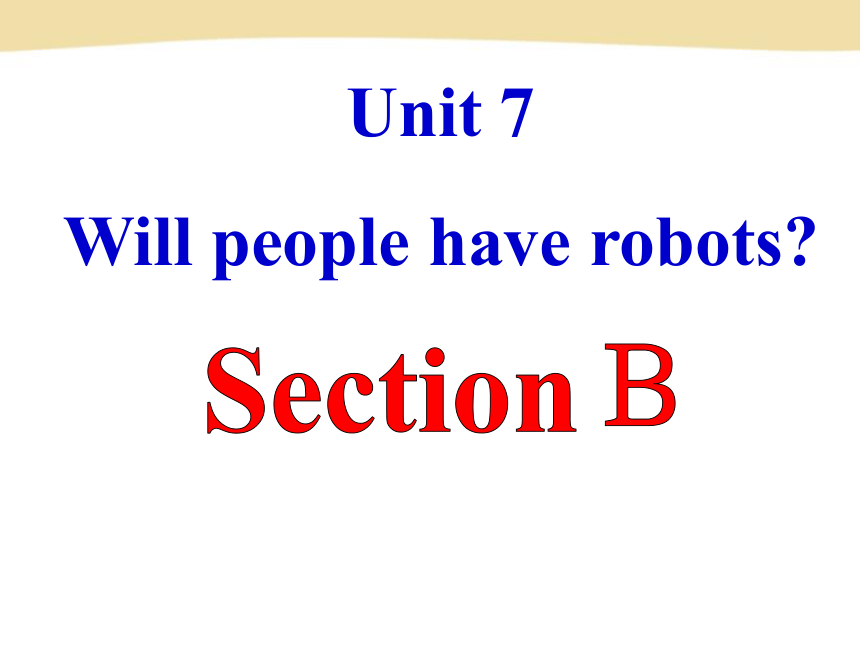 | |
| 格式 | ppt | ||
| 文件大小 | 3.7MB | ||
| 资源类型 | 教案 | ||
| 版本资源 | 人教新目标(Go for it)版 | ||
| 科目 | 英语 | ||
| 更新时间 | 2022-10-06 11:32:06 | ||
图片预览

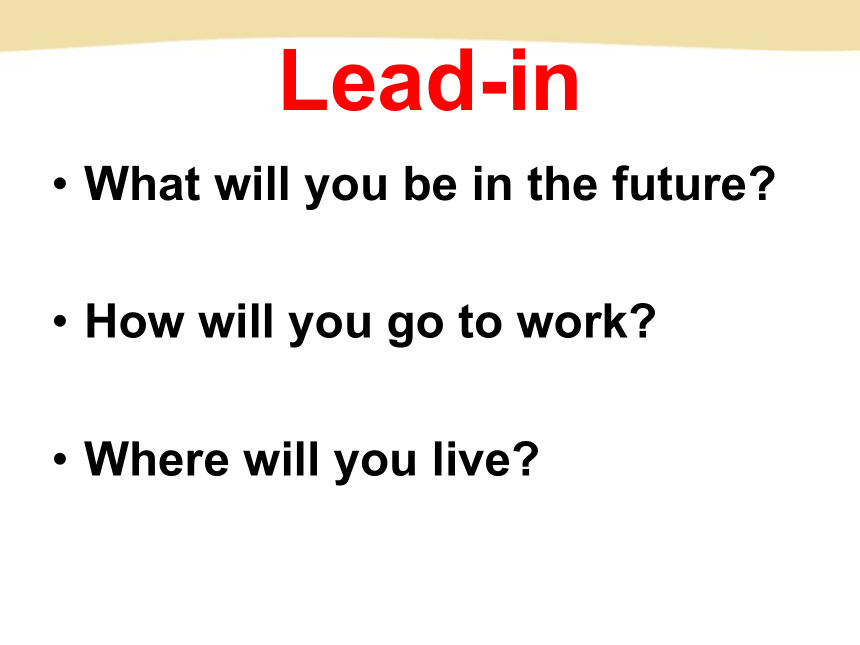
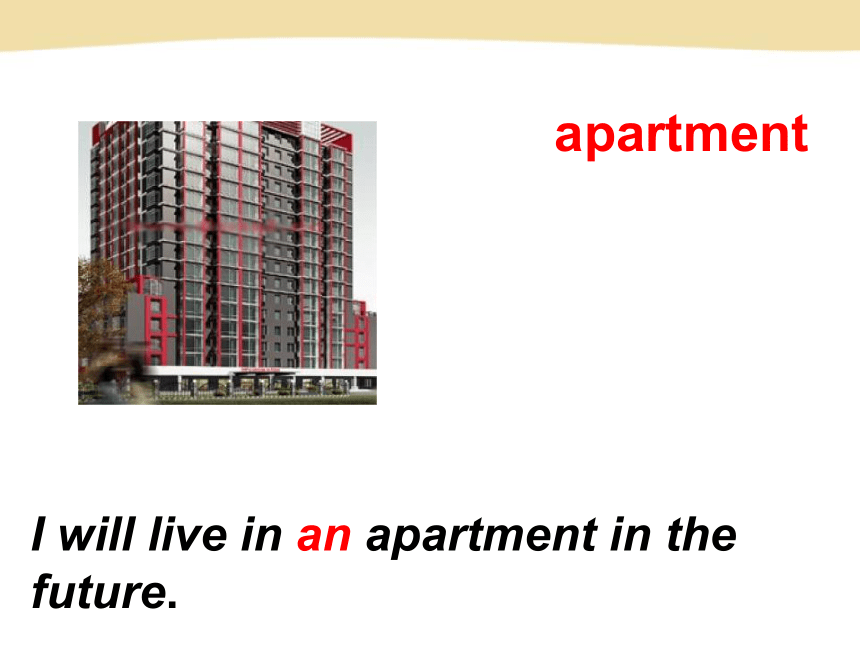
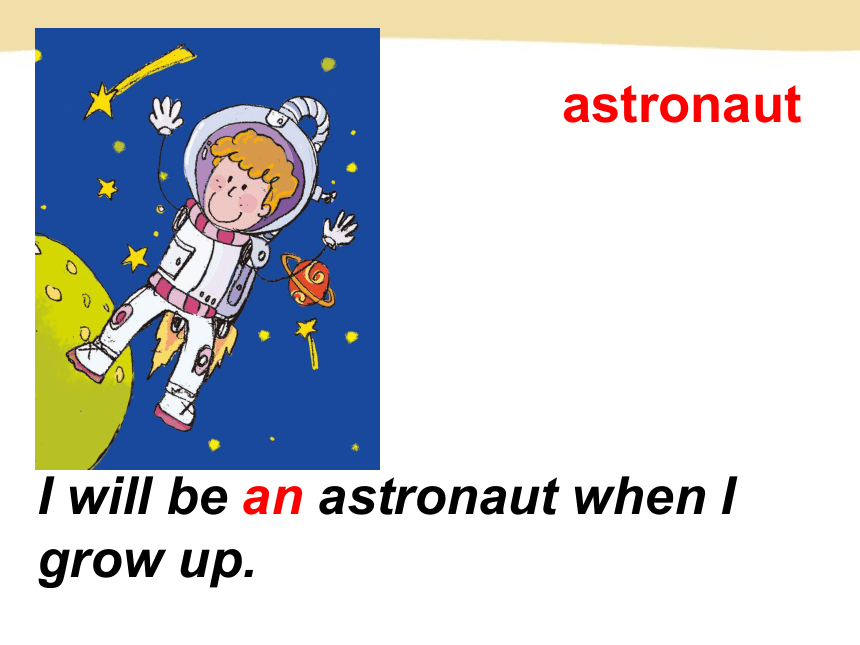
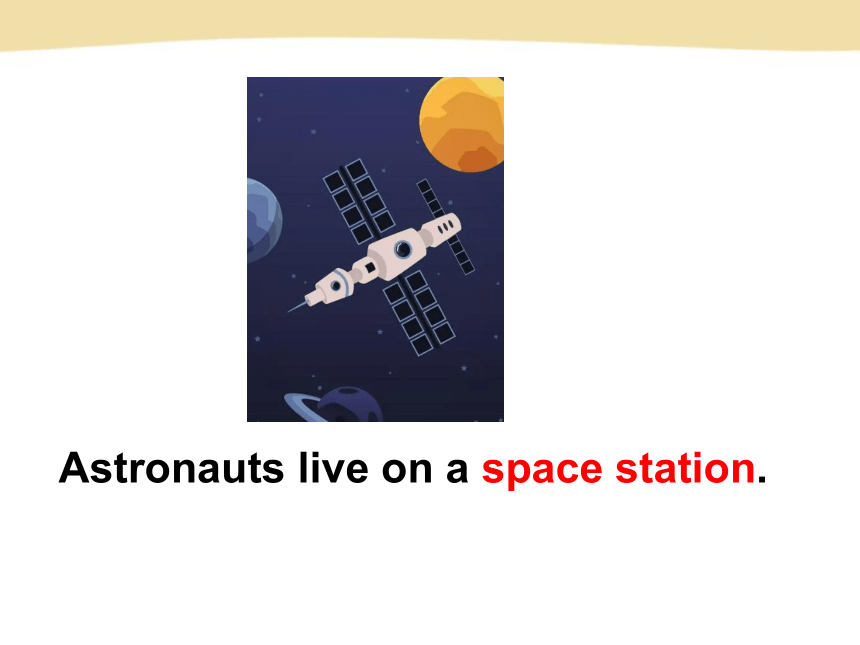
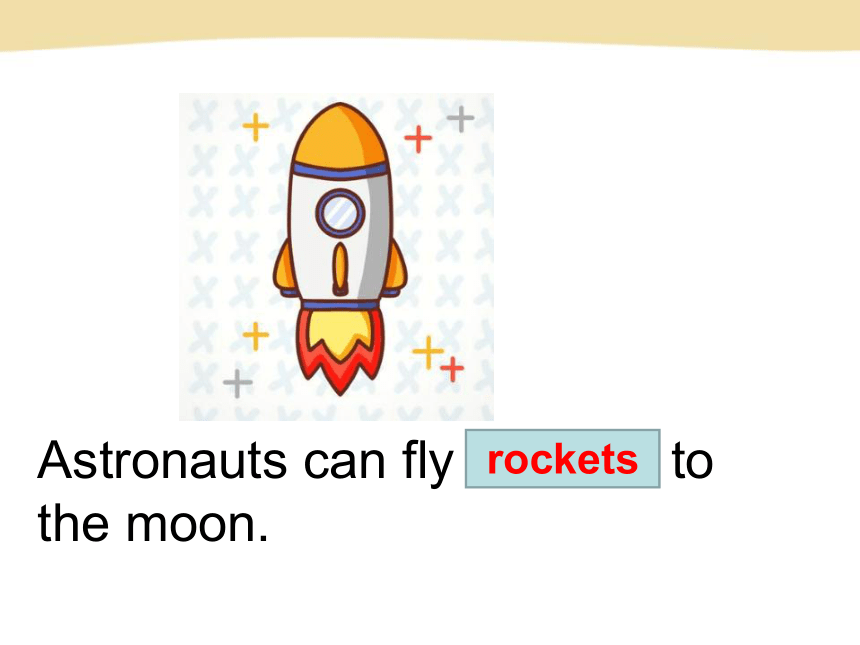
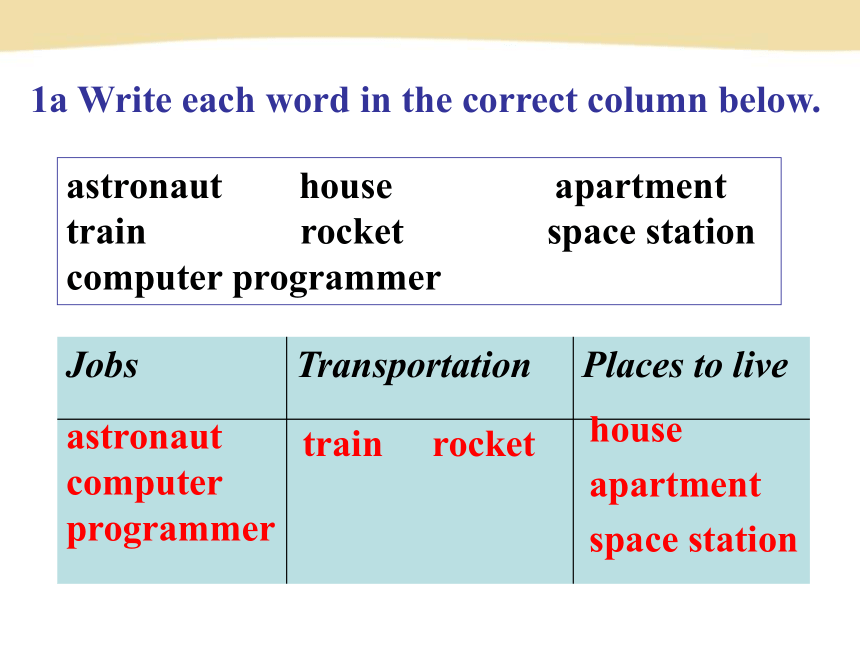
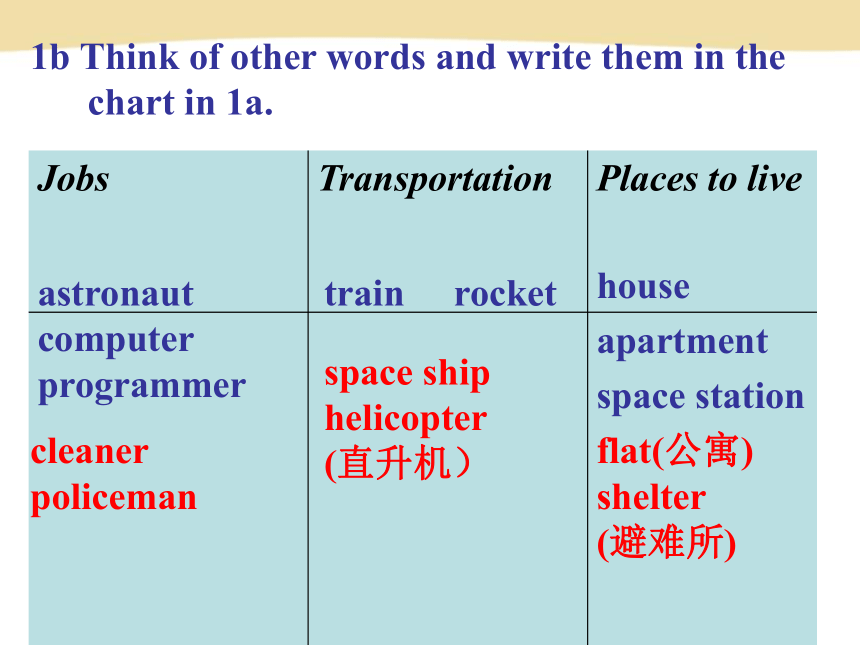
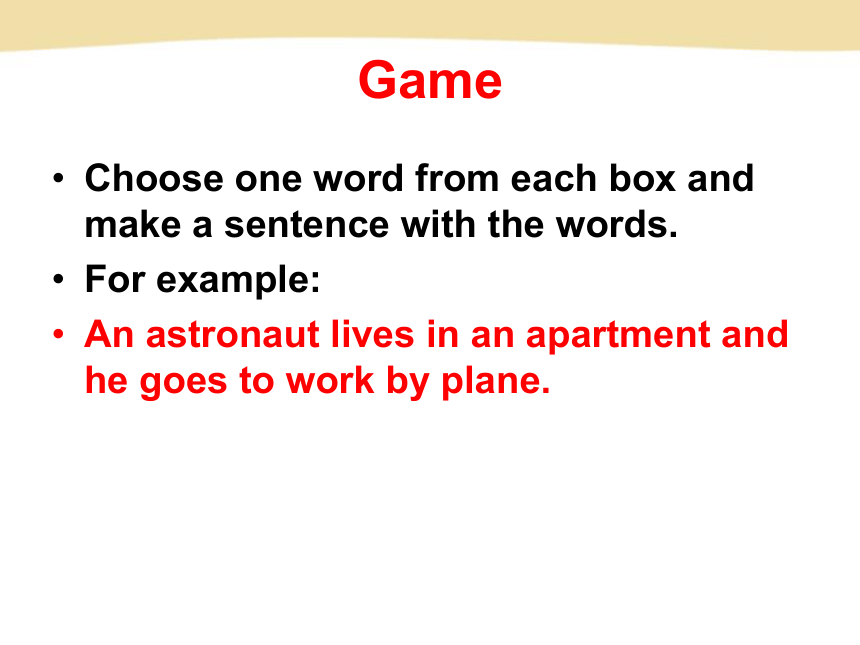
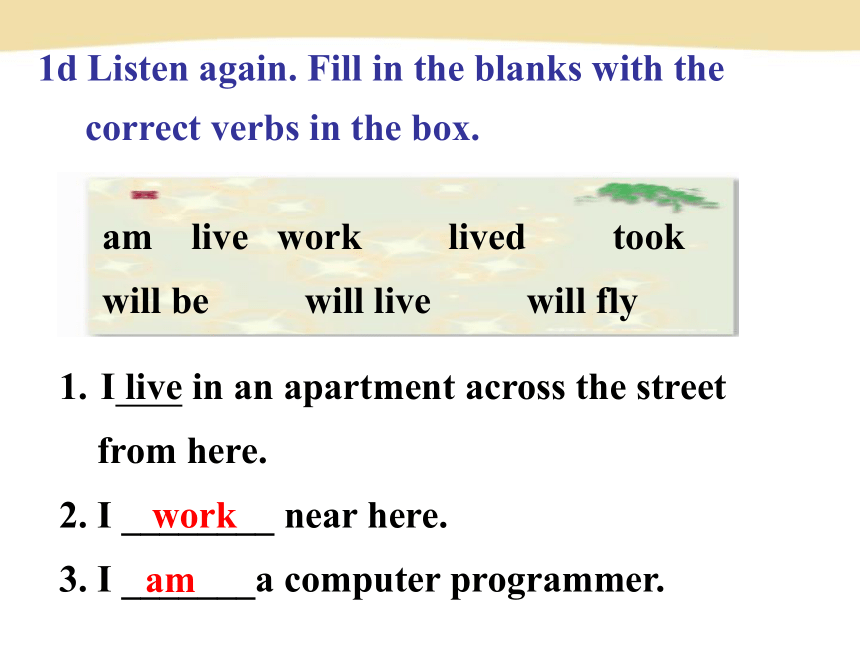
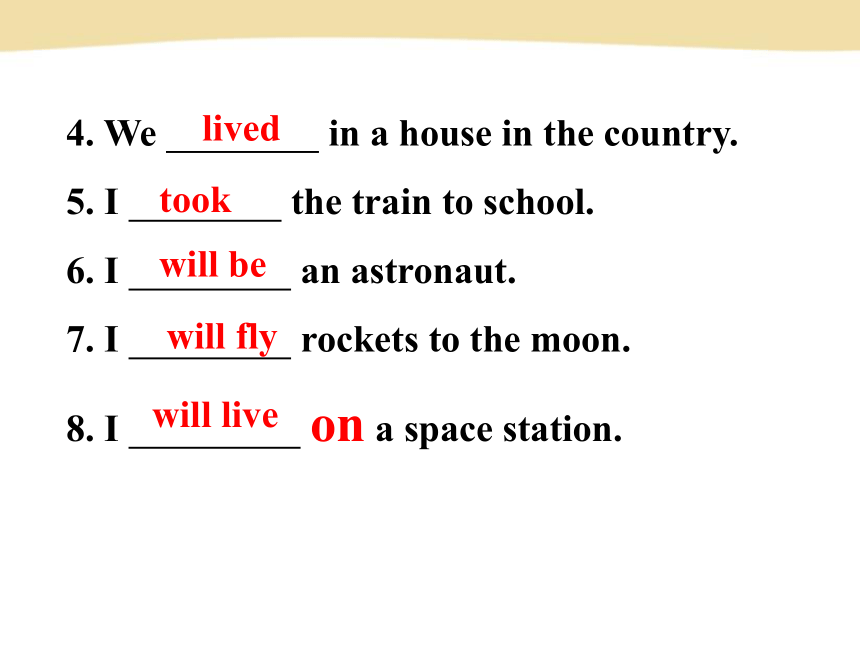
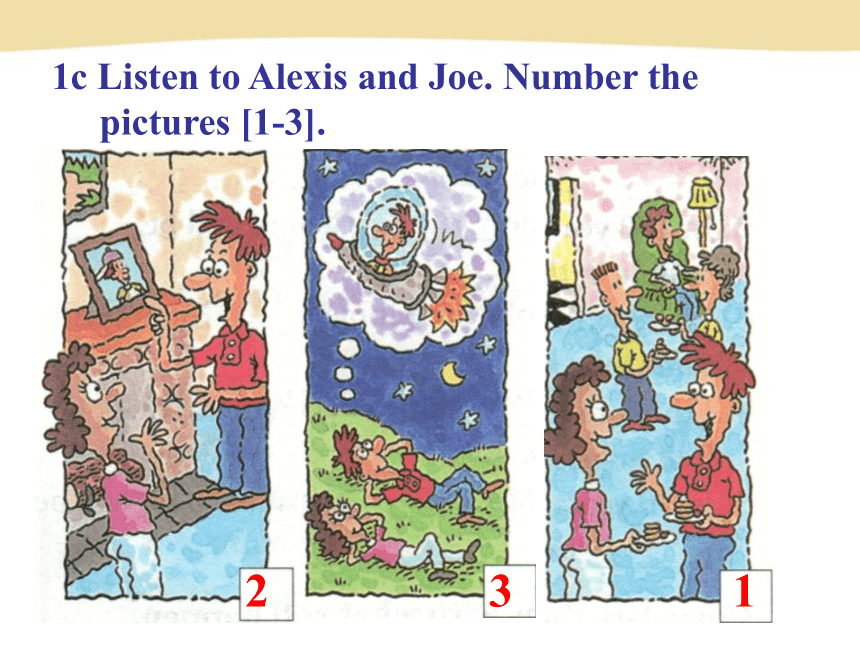
文档简介
(共58张PPT)
Unit 7
Will people have robots
Lead-in
What will you be in the future
How will you go to work
Where will you live
apartment
I will live in an apartment in the future.
astronaut
I will be an astronaut when I grow up.
Astronauts live on a space station.
Astronauts can fly a rocket to the moon.
rockets
1a Write each word in the correct column below.
astronaut house apartment
train rocket space station
computer programmer
Jobs Transportation Places to live
astronaut
computer
programmer
train rocket
house
apartment
space station
1b Think of other words and write them in the
chart in 1a.
Jobs Transportation Places to live
astronaut
computer
programmer
train rocket
house
apartment
space station
cleaner
policeman
space ship
helicopter
(直升机)
flat(公寓)
shelter
(避难所)
Game
Choose one word from each box and make a sentence with the words.
For example:
An astronaut lives in an apartment and he goes to work by plane.
1d Listen again. Fill in the blanks with the
correct verbs in the box.
I live in an apartment across the street
from here.
2. I ________ near here.
3. I _______a computer programmer.
am live work lived took
will be will live will fly
work
am
4. We in a house in the country.
5. I the train to school.
6. I an astronaut.
7. I rockets to the moon.
8. I on a space station.
lived
will be
will fly
took
will live
1c Listen to Alexis and Joe. Number the
pictures [1-3].
2
3
1
1e Student A is Alexis and Student B is Joe.
Talk about Joe’s life now, 10 years ago
and 10 years from now.
A: Where do you live
B: I live in an apartment.
A: Where do you work
B: I work near here.
A: What do you do
B: I am a computer programmer.
A: Where did you live 10 years ago
B: We lived in a house in the country.
A: How did you get to school
B: I took the train to school.
10 years ago
A: What will you be in 10 years
B: Oh, I think I’ll be an astronaut.
A: Where will you live in 10 years
B: I will live on a space station.
A: How will you get to the moon
B: I will fly rockets to the moon.
In 10 years
Pair work
A: Where did you live two years ago
B: …
A: How did you go to school
B: …
A: Where do you live now
B: …
A: How do you go to school
B: …
A: What will you be when you grow up
B: …
A: Where will you live in 10 years
B: …
A: How will you go to work
B: …
What do you know about robots
What do they look like
They look like humans.
What does it look like
It looks like a dog.
This robot looks like a huge arm.
What will robots do for us
in the future
Let’s make predictions.
In 100 years, robots will …
speak
do exercise
run
cook
play the piano
play football
dance
help people do the most unpleasant jobs
help with housework
2b Read the article and match each paragraph
with the question it discusses.
Para 1 Will robots think like humans in
the future
Para 2 What will robots be like in the
future
Para 3 What can robots do today
Para 4 What are robots like in movies
Do You Think You Will Have
Your Own Robot
When we watch movies about the future,
we sometimes see robots. They are usually
like human servants. They help with the
housework and do jobs like working in dirty
or dangerous places.
2.Today there are already robots working in
factories. Some can help to build cars, and
they do simple jobs over and over again. Fewer
people will do such jobs in the future because
they are boring, but robots will never get bored.
Scientists are now trying to make robots look like humans and do the same things as we do. Some robots in Japan can walk and dance.
They are fun to watch. However, some
scientists believe that although we can make robots move like people, it will be difficult to make them really think like a human. For example, scientist James White thinks that robots will never be able to wake up and know
3.
where they are. But many scientists disagree with Mr. White. They think that robots will even be able to talk like humans in 25 to 50 years.
Some scientists believe that there will be more robots in the future. However, they agree it may take hundreds of years.
These new robots will have many different shapes. Some will look like humans, and others might look like animals. In India, for example, scientists made robots that
4.
look like snakes. If buildings
fall down with people inside,
these snake robots can help
look for people under the
buildings. This was not
possible 20 years ago, but computers and rockets also seemed impossible 100 years ago. We never know what will happen in the future!
2c Read the article again quickly. Complete the
sentences about what robots can do now.
1.Robots can build in factories.
2.They can do jobs many times and
not get bored.
3.Some can and .
4. Some can help people under
.
cars
simple
walk dance
look for
the buildings
*
What can robots do now What will robots be able to do in the future
Fill in the blanks
Move like people
Talk like people
Build cars
Do simple jobs
Walk and dance
Help look for people
Answer the questions
1. Which two paragraphs talk about the different opinions from scientists
2. What are the two different opinions toward the development(发展) of robots
Paragraph 3 and Paragraph 4.
Some think robots won’t really think like a human but some think robots will even be able to talk.
3. Which side does the writer take Why
The writer will take neither of the sides, because the writer thinks we never know what will happen in the future.
Some robots are very human-like. They can walk and _________ like people. Some scientists think that in the future they will _______ robots more like humans. This may not ______________ in the near future, but at some point, robots will even be able to _________ like people.
2d Fill in the blanks in this paragraph with
words from the article.
dance
make
be possible
talk
However, some scientists _______ . James White believes that robots won’t be able to do the _________ things as us. For example, he thinks that robots will_______ be able to wake up and know where they are. Which side do you_____ with
same
never
agree
disagree
2e What kinds of animals might robots look like in the future What do you think these robots will be able to do Write your ideas and discuss them with your partner.
I think some future robots might look like
butterflies. They will be able to sing and dance.
When I am sad, they can try their best to make
me happy. And when I want to go shopping, they
can take me to the store so that I will
never stand on the crowded street. In my life,
it will give me a lot of help.
…and they do simple jobs over and over again.
……并且他们反复的干着简单的工作
over and over again是固定搭配,译为:反复
的;多次”, 还可以说 over and over。例如:
They sang the song over and over.
他们反复的唱着那首歌。
They call over and over again but nobody
answered. 他多次打电话,但没人接。
Language points
2. Fewer people will do such jobs in the future
because they are boring, but robots will never
get bored.
此句中的get bored 译为“ 感到厌烦,感到无
聊”。其同义词为:be bored 二者的区别在于:
get bored(强调动作) be bored (强调状态)
英语中有很多过去分词或形容词都可以和get,
be 连用。比如:tired,angry 等。例如:
You won't be bored when you are hungry.
当你饿的时候你就不会觉得无聊了。
If you do the same things month after month, you may get bored.
如果你每月都做同样的事情,你可能会感到厌烦。
3. Some robots are very human-like.
一些机器人十分像真人。
在human-like (形似真人的;真人一样的)
一词中,-like 为形容词后缀,用在名词之后,与其构成一个完整的形容词,表示“ 形似……的;像……一样的;类似于…..的”。
又如: a bird-like building (像鸟一样的建筑)
a cabbage-like vegetable(一种形似卷心菜的蔬菜),the ball-like thing on the top of the building(楼顶上那个像球一样的东西。)
4. It will be difficult to make them really think
like a human.
把机器人做的像人一样思考将会很难。
通常用it 做形式主语,将不定式和动名词置
于谓语后面,特别是主语较长时,或在一些
习惯用法中。当谓语是系表结构(be + 形容
词/ 名词)时,常将不定式后置,构成句型
“it + be + 表语(形容词 / 名词)+ 不定式”。
e.g. It is not an easy thing to master a foreign
language. 掌握一门外语不是件容易的事
5. Scientist James White thinks that robots will never be able to wake up.
Be able to “能够…..”
can vs be able to
相同点: 两者都表示能力
不同点:
can只有现在式和过去式。
be able to可用于现在时、过去时和将来时, 但它没有进行时。
3) 表示经过努力而成功的某一次动作, 只能用
be able to.
试做以下试题:
①He ____________ drive a car.
②He ____________climb over the mountain before.
can
was able to
6. But many scientists disagree with Mr. White.
但很多科学家不赞同怀特先生的观点。
这里的“disagree with ”译为 不同意;不一
致;不适合 。
固定搭配:
agree (同意)
agree with sb/sth
disagree (同意)
disagree with sb/sth
e.g. They disagreed with each other about the
time and place of the accident.
他们在对事故发生的时间和地点彼此有
分歧。
I strongly disagree with his views.
我强烈反对他的见解。
I disagree completely with Jack.
我完全不同意杰克的意见。
7.If buildings fall down with people inside,
these snake robots can help look for people
under the buildings.
如果建筑物倒塌,人还在里面,这些蛇形
机器人可以帮助在坍塌的建筑物里搜救伤者。
fall down 的意思如下:
1)掉下,落下,跌倒:
The old lady fell down in the street and broke her leg.
老妇跌倒在大街上,摔坏了腿。
2)拜倒,跪倒:
They fell down before him.
他们拜倒在他面前。
3)倒塌:
The old house soon fell down.
这座老房很快就倒塌了。
Ⅰ. 用一般将来时填空。(借助will)
1. I _________ (visit) my uncle tomorrow.
2. There _______ (be) a football match in
our school next week.
3. He __________ (help) you with your English
this evening.
4. They _________(play) soccer if it doesn’t rain.
5. We _________ (have) a meeting tomorrow.
will visit
will be
will help
will play
will have
Ⅱ. 翻译句子
1. 你认为人们的家里会有机器人吗
Do ______ ______ there will be robots
_____ ___________ homes
2. 人们将活到150岁。
People ______ _____ _____ _____150 years old.
3. 我认为她会当医生。
I think she ______ ____ a doctor.
you think
in people’s
will live to be
will be
4. 你住哪儿 我住在北京。
______ _____ _____ ______ I live in Beijing.
5.他反复看她的来信。
He read her letter ____ ____ ____ _______.
6.等了很长一段时间后他厌烦了。
He _____ _______ after he waited for long.
over and over again
got bored
Where do you live
Ⅲ. 完成句子
1. 凯蒂不能参加运动会了。
Kitty ____ ______ ________ ______take part in
the sports meeting.
2. 昨天有好几百人来我们学校参观。
______ ___ people came to visit our school yesterday.
3. 彼得在上海找到了一份工作,他不得不在那里独自
生活。Peter finds a job in Shanghai, so he has to
_____there_______.
Hundreds of
is not able to
live alone
4. 我们家乡的污染没有以前严重了。
There is _____ ___________ in our
hometown than before.
5. 十年后你会是什么样子?
How ____ ____ __ ______ in ten years
less pollution
Will you be like
Ⅳ.单项选择
1.The next time you see Nikos, he _____
sixteen years old.
A. will be B. is C. was D. will
2.Margot_______computer science last year.
A. studies B. studied
C. will study D. is studying
3.In ten years, John_______ an astronaut.
A. is B. will be C. was D. will
A
B
B
4. How many people_____ there fifty years ago.
A. will B. were C. are D. will be
5. In AD 20 000,what_______the world be like
A. is B. will C. was D. are
6.There is_______ meat but_______ cakes on
the plate. Please have one.
A. a little; a few B. a few; a little
C. few; little D. little; a few
D
B
D
7.There is very _______on this street.
A. few traffics B. little traffics
C. few traffic D. little traffic
8.What is your favorite 21st century prediction —I predict there will be _______leisure time.
A. many B. few C. fewer D. less
D
D
Unit 7
Will people have robots
Lead-in
What will you be in the future
How will you go to work
Where will you live
apartment
I will live in an apartment in the future.
astronaut
I will be an astronaut when I grow up.
Astronauts live on a space station.
Astronauts can fly a rocket to the moon.
rockets
1a Write each word in the correct column below.
astronaut house apartment
train rocket space station
computer programmer
Jobs Transportation Places to live
astronaut
computer
programmer
train rocket
house
apartment
space station
1b Think of other words and write them in the
chart in 1a.
Jobs Transportation Places to live
astronaut
computer
programmer
train rocket
house
apartment
space station
cleaner
policeman
space ship
helicopter
(直升机)
flat(公寓)
shelter
(避难所)
Game
Choose one word from each box and make a sentence with the words.
For example:
An astronaut lives in an apartment and he goes to work by plane.
1d Listen again. Fill in the blanks with the
correct verbs in the box.
I live in an apartment across the street
from here.
2. I ________ near here.
3. I _______a computer programmer.
am live work lived took
will be will live will fly
work
am
4. We in a house in the country.
5. I the train to school.
6. I an astronaut.
7. I rockets to the moon.
8. I on a space station.
lived
will be
will fly
took
will live
1c Listen to Alexis and Joe. Number the
pictures [1-3].
2
3
1
1e Student A is Alexis and Student B is Joe.
Talk about Joe’s life now, 10 years ago
and 10 years from now.
A: Where do you live
B: I live in an apartment.
A: Where do you work
B: I work near here.
A: What do you do
B: I am a computer programmer.
A: Where did you live 10 years ago
B: We lived in a house in the country.
A: How did you get to school
B: I took the train to school.
10 years ago
A: What will you be in 10 years
B: Oh, I think I’ll be an astronaut.
A: Where will you live in 10 years
B: I will live on a space station.
A: How will you get to the moon
B: I will fly rockets to the moon.
In 10 years
Pair work
A: Where did you live two years ago
B: …
A: How did you go to school
B: …
A: Where do you live now
B: …
A: How do you go to school
B: …
A: What will you be when you grow up
B: …
A: Where will you live in 10 years
B: …
A: How will you go to work
B: …
What do you know about robots
What do they look like
They look like humans.
What does it look like
It looks like a dog.
This robot looks like a huge arm.
What will robots do for us
in the future
Let’s make predictions.
In 100 years, robots will …
speak
do exercise
run
cook
play the piano
play football
dance
help people do the most unpleasant jobs
help with housework
2b Read the article and match each paragraph
with the question it discusses.
Para 1 Will robots think like humans in
the future
Para 2 What will robots be like in the
future
Para 3 What can robots do today
Para 4 What are robots like in movies
Do You Think You Will Have
Your Own Robot
When we watch movies about the future,
we sometimes see robots. They are usually
like human servants. They help with the
housework and do jobs like working in dirty
or dangerous places.
2.Today there are already robots working in
factories. Some can help to build cars, and
they do simple jobs over and over again. Fewer
people will do such jobs in the future because
they are boring, but robots will never get bored.
Scientists are now trying to make robots look like humans and do the same things as we do. Some robots in Japan can walk and dance.
They are fun to watch. However, some
scientists believe that although we can make robots move like people, it will be difficult to make them really think like a human. For example, scientist James White thinks that robots will never be able to wake up and know
3.
where they are. But many scientists disagree with Mr. White. They think that robots will even be able to talk like humans in 25 to 50 years.
Some scientists believe that there will be more robots in the future. However, they agree it may take hundreds of years.
These new robots will have many different shapes. Some will look like humans, and others might look like animals. In India, for example, scientists made robots that
4.
look like snakes. If buildings
fall down with people inside,
these snake robots can help
look for people under the
buildings. This was not
possible 20 years ago, but computers and rockets also seemed impossible 100 years ago. We never know what will happen in the future!
2c Read the article again quickly. Complete the
sentences about what robots can do now.
1.Robots can build in factories.
2.They can do jobs many times and
not get bored.
3.Some can and .
4. Some can help people under
.
cars
simple
walk dance
look for
the buildings
*
What can robots do now What will robots be able to do in the future
Fill in the blanks
Move like people
Talk like people
Build cars
Do simple jobs
Walk and dance
Help look for people
Answer the questions
1. Which two paragraphs talk about the different opinions from scientists
2. What are the two different opinions toward the development(发展) of robots
Paragraph 3 and Paragraph 4.
Some think robots won’t really think like a human but some think robots will even be able to talk.
3. Which side does the writer take Why
The writer will take neither of the sides, because the writer thinks we never know what will happen in the future.
Some robots are very human-like. They can walk and _________ like people. Some scientists think that in the future they will _______ robots more like humans. This may not ______________ in the near future, but at some point, robots will even be able to _________ like people.
2d Fill in the blanks in this paragraph with
words from the article.
dance
make
be possible
talk
However, some scientists _______ . James White believes that robots won’t be able to do the _________ things as us. For example, he thinks that robots will_______ be able to wake up and know where they are. Which side do you_____ with
same
never
agree
disagree
2e What kinds of animals might robots look like in the future What do you think these robots will be able to do Write your ideas and discuss them with your partner.
I think some future robots might look like
butterflies. They will be able to sing and dance.
When I am sad, they can try their best to make
me happy. And when I want to go shopping, they
can take me to the store so that I will
never stand on the crowded street. In my life,
it will give me a lot of help.
…and they do simple jobs over and over again.
……并且他们反复的干着简单的工作
over and over again是固定搭配,译为:反复
的;多次”, 还可以说 over and over。例如:
They sang the song over and over.
他们反复的唱着那首歌。
They call over and over again but nobody
answered. 他多次打电话,但没人接。
Language points
2. Fewer people will do such jobs in the future
because they are boring, but robots will never
get bored.
此句中的get bored 译为“ 感到厌烦,感到无
聊”。其同义词为:be bored 二者的区别在于:
get bored(强调动作) be bored (强调状态)
英语中有很多过去分词或形容词都可以和get,
be 连用。比如:tired,angry 等。例如:
You won't be bored when you are hungry.
当你饿的时候你就不会觉得无聊了。
If you do the same things month after month, you may get bored.
如果你每月都做同样的事情,你可能会感到厌烦。
3. Some robots are very human-like.
一些机器人十分像真人。
在human-like (形似真人的;真人一样的)
一词中,-like 为形容词后缀,用在名词之后,与其构成一个完整的形容词,表示“ 形似……的;像……一样的;类似于…..的”。
又如: a bird-like building (像鸟一样的建筑)
a cabbage-like vegetable(一种形似卷心菜的蔬菜),the ball-like thing on the top of the building(楼顶上那个像球一样的东西。)
4. It will be difficult to make them really think
like a human.
把机器人做的像人一样思考将会很难。
通常用it 做形式主语,将不定式和动名词置
于谓语后面,特别是主语较长时,或在一些
习惯用法中。当谓语是系表结构(be + 形容
词/ 名词)时,常将不定式后置,构成句型
“it + be + 表语(形容词 / 名词)+ 不定式”。
e.g. It is not an easy thing to master a foreign
language. 掌握一门外语不是件容易的事
5. Scientist James White thinks that robots will never be able to wake up.
Be able to “能够…..”
can vs be able to
相同点: 两者都表示能力
不同点:
can只有现在式和过去式。
be able to可用于现在时、过去时和将来时, 但它没有进行时。
3) 表示经过努力而成功的某一次动作, 只能用
be able to.
试做以下试题:
①He ____________ drive a car.
②He ____________climb over the mountain before.
can
was able to
6. But many scientists disagree with Mr. White.
但很多科学家不赞同怀特先生的观点。
这里的“disagree with ”译为 不同意;不一
致;不适合 。
固定搭配:
agree (同意)
agree with sb/sth
disagree (同意)
disagree with sb/sth
e.g. They disagreed with each other about the
time and place of the accident.
他们在对事故发生的时间和地点彼此有
分歧。
I strongly disagree with his views.
我强烈反对他的见解。
I disagree completely with Jack.
我完全不同意杰克的意见。
7.If buildings fall down with people inside,
these snake robots can help look for people
under the buildings.
如果建筑物倒塌,人还在里面,这些蛇形
机器人可以帮助在坍塌的建筑物里搜救伤者。
fall down 的意思如下:
1)掉下,落下,跌倒:
The old lady fell down in the street and broke her leg.
老妇跌倒在大街上,摔坏了腿。
2)拜倒,跪倒:
They fell down before him.
他们拜倒在他面前。
3)倒塌:
The old house soon fell down.
这座老房很快就倒塌了。
Ⅰ. 用一般将来时填空。(借助will)
1. I _________ (visit) my uncle tomorrow.
2. There _______ (be) a football match in
our school next week.
3. He __________ (help) you with your English
this evening.
4. They _________(play) soccer if it doesn’t rain.
5. We _________ (have) a meeting tomorrow.
will visit
will be
will help
will play
will have
Ⅱ. 翻译句子
1. 你认为人们的家里会有机器人吗
Do ______ ______ there will be robots
_____ ___________ homes
2. 人们将活到150岁。
People ______ _____ _____ _____150 years old.
3. 我认为她会当医生。
I think she ______ ____ a doctor.
you think
in people’s
will live to be
will be
4. 你住哪儿 我住在北京。
______ _____ _____ ______ I live in Beijing.
5.他反复看她的来信。
He read her letter ____ ____ ____ _______.
6.等了很长一段时间后他厌烦了。
He _____ _______ after he waited for long.
over and over again
got bored
Where do you live
Ⅲ. 完成句子
1. 凯蒂不能参加运动会了。
Kitty ____ ______ ________ ______take part in
the sports meeting.
2. 昨天有好几百人来我们学校参观。
______ ___ people came to visit our school yesterday.
3. 彼得在上海找到了一份工作,他不得不在那里独自
生活。Peter finds a job in Shanghai, so he has to
_____there_______.
Hundreds of
is not able to
live alone
4. 我们家乡的污染没有以前严重了。
There is _____ ___________ in our
hometown than before.
5. 十年后你会是什么样子?
How ____ ____ __ ______ in ten years
less pollution
Will you be like
Ⅳ.单项选择
1.The next time you see Nikos, he _____
sixteen years old.
A. will be B. is C. was D. will
2.Margot_______computer science last year.
A. studies B. studied
C. will study D. is studying
3.In ten years, John_______ an astronaut.
A. is B. will be C. was D. will
A
B
B
4. How many people_____ there fifty years ago.
A. will B. were C. are D. will be
5. In AD 20 000,what_______the world be like
A. is B. will C. was D. are
6.There is_______ meat but_______ cakes on
the plate. Please have one.
A. a little; a few B. a few; a little
C. few; little D. little; a few
D
B
D
7.There is very _______on this street.
A. few traffics B. little traffics
C. few traffic D. little traffic
8.What is your favorite 21st century prediction —I predict there will be _______leisure time.
A. many B. few C. fewer D. less
D
D
同课章节目录
- Unit 1 Where did you go on vacation?
- Section A
- Section B
- Unit 2 How often do you exercise?
- Section A
- Section B
- Unit 3 I'm more outgoing than my sister.
- Section A
- Section B
- Unit 4 What's the best movie theater?
- Section A
- Section B
- Unit 5 Do you want to watch a game show?
- Section A
- Section B
- Unit 6 I'm going to study computer science.
- Section A
- Section B
- Unit 7 Will people have robots?
- Section A
- Section B
- Unit 8 How do you make a banana milk shake?
- Section A
- Section B
- Unit 9 Can you come to my party?
- Section A
- Section B
- Unit 10 If you go to the party, you'll have a grea
- Section A
- Section B
